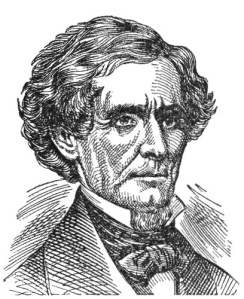
In the pantheon of the Lost Cause myth, Jefferson Davis has never figured very large. Lord knows his small but loyal following has tried, but the truth is, compared to Lee, Stuart and Stonewall, old Jeffie has never been a terribly sympathetic figure. Suspicious of his generals, opinionated, prone to cronyism, holder of grudges and a whole host of other less than noble traits, Confederate sainthood has always been a hard sell for him. Not that one can’t make a case for Davis as a leader: Jeff Davis had to contend with egotistical generals, petty politicians and innumerable problems with shortages of military supplies, manpower and money, and given the many limitations he faced, one could argue he handled them better than any other Southern leader would have.

Then, when the end came for the Confederacy, virtually alone among all Southern leaders—including many who had fomented Secession far more aggressively than he—Davis was thrown in a dungeon to rot for several years, ostensibly to await trial for treason. Davis probably would have loved to have been put on trial; it would have given him a forum to argue that secession was legal and constitutional and that he had done nothing wrong. This was exactly why the Federal authorities did not bring Davis to trial—not even under a military tribunal. After spending four years and hundreds of thousands of lives to suppress the rebellion, the last thing anyone in the North wanted was to reopen the whole issue of states rights and secession, even in a show trial.

Davis remained in a casemate cell in Fort Monroe for several years after his capture. His devoted wife Lavinia pleaded her husband’s case to whoever would listen, even to the Pope in Rome. Eventually old Jeffie was set free and he retired to the Gulf Coast to write his memoirs and argue to the world that he was right all along and everyone else wrong. If he weren’t so unsympathetic a character, one could well regard him as a tragic figure.
As it is, however, while Jefferson Davis was less than successful in life, in death he has succeeded admirably as a first class ghost. Moreover, a number of places where he once resided are widely known to be haunted.
Fort Monroe is technically in Virginia, but all through the war it was securely in Union hands and in fact is still an active army base. It was here that Davis was confined after his capture, kept in shackles twenty-four hours a day in Casemate No.2. Oddly, Jefferson Davis’ ghost has not been reported there but on the citadel’s ramparts, called the Terraplain. On a moonlit night one may see the gaunt figure wandering beneath the flagpole that sits atop the walls, pacing to and fro, wishing to be free. His wife, Varina, also haunts the old fort, in an apartment provided for her on the fortresses grounds. The windows in that apartment have been known to rattle all of their own, the spectre of Varina expressing her frustration at her husband’s incarceration no doubt.

The Davis’ previous residence in Richmond, sometimes called “The Confederate White House,” has also been reported haunted. While one can never be entirely sure about these things, the haunting is thought to relate to the death of one of their children, who died in an accident during the war.
Yet another favorite haunt of the Rebel President is Beauvoir, overlooking Mississippi’s Gulf Coast. It was here he and his wife retreated to after Davis was let loose in 1867 and where he wrote his lengthy and tendentious memoirs of his years heading the Secessionist government. While some have seen apparitions here, the ghosts are mostly unseen, with occasional manifestations, such as a bust crying tears, or the eerie sense someone is following behind you as you tour the house. There are also some ghosts in gray, who may be the shades of Confederate veterans who lived here in the years after Davis died. Whatever one may say about Jefferson Davis, he has one virtue which a few more modern residents of his state may profitably emulate; at least he eventually stopped fighting the war.

Although it suffered greatly from Hurricane Katrina, Beauvoir has been restored and is again open to visitors and even if one has little sympathy for the Lost Cause, one should visit this token of another era, for here resided the last prisoner of the Late Unpleasantness. May he rest in peace—but I doubt it.
For more about the hauntings of Jefferson Davis and his wife, as well as other true supernatural doings regarding the Civil War, go to Ghosts and Haunts of the Civil War; for documented paranormal phenomena regarding Lincoln, see The Paranormal Presidency. For authentic accounts of Civil War ghosts in the Mid South, see Strange Tales of the Dark and Bloody Ground.